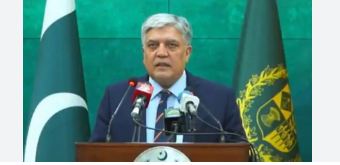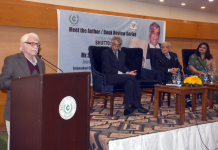Saifullah Ansar
ISLAMABAD, OCT 17 /DNA/ – Foreign Office Spokesperson Ambassador Shafqat Ali Khan, in his final weekly media briefing on Friday announced key diplomatic developments, including Pakistan’s re-election to the United Nations Human Rights Council (UNHRC), the implementation of a temporary ceasefire along the Pakistan-Afghanistan border, and the country’s active participation in the recent Gaza Peace Summit in Sharm el-Sheikh.
Delivering his last official briefing as spokesperson, Ambassador Shafqat Ali Khan reaffirmed Pakistan’s “unwavering commitment to regional peace, sovereignty, and constructive diplomacy,” emphasizing that Pakistan had “effectively repulsed unprovoked assaults by the Afghan Taliban” along the border earlier this week. He said the temporary ceasefire, agreed upon with the Taliban regime, took effect on October 15 for 48 hours to allow dialogue-based resolution of tensions.
“Pakistan exercised its right to self-defense and responded in a targeted and precise manner, avoiding civilian harm,” the spokesperson said, adding that Pakistan expected “concrete and verifiable actions” by the Taliban against terrorist groups operating from Afghan soil. He strongly rejected “baseless assertions” made by the Afghan interim foreign minister in India, calling them an attempt to deflect attention from the presence of terrorist networks in Afghanistan.
Ambassador Shafqat also revealed that Pakistan had lodged strong reservations over the recent India-Afghanistan joint statement, which referred to Jammu and Kashmir as part of India. “This reference violates UN Security Council resolutions and disregards the legal and historical status of Jammu and Kashmir,” he said.
Highlighting Pakistan’s humanitarian approach, the spokesperson said Islamabad continues to host around four million Afghan nationals and will regulate their stay in line with international norms and domestic laws. “Pakistan desires a peaceful, stable, friendly, inclusive, and prosperous Afghanistan,” he noted.
Ambassador Shafqat announced that Pakistan was elected to the UN Human Rights Council for the term 2026–2028 with an overwhelming majority of 178 votes. “This marks Pakistan’s sixth election to the Council since its establishment in 2006 and reflects the global community’s confidence in our commitment to human rights and consensus building,” he said. Pakistan, he added, will continue to spotlight human rights violations in Indian Illegally Occupied Jammu and Kashmir and Palestine.
The spokesperson also briefed media on Prime Minister Muhammad Shehbaz Sharif’s participation in the Peace Summit in Sharm el-Sheikh, jointly hosted by Egyptian President Abdel Fattah el-Sisi and U.S. President Donald Trump. The summit brought together 30 global leaders to address the Gaza crisis. “Pakistan’s active diplomatic engagement reinforced its standing as a responsible regional actor,” he said, noting the Prime Minister’s meetings with the Presidents of Palestine, the U.S., Azerbaijan, and Armenia, among others.
Deputy Prime Minister and Foreign Minister Senator Mohammad Ishaq Dar, he said, also held a series of important bilateral meetings with counterparts from Egypt, Turkey, the U.S., and Saudi Arabia, underscoring Pakistan’s growing diplomatic outreach.
Ambassador Shafqat Ali Khan concluded the briefing by reaffirming Pakistan’s resolve to pursue peace through diplomacy and cooperation, saying it had been “an honour to serve as the voice of Pakistan’s foreign policy.”

















